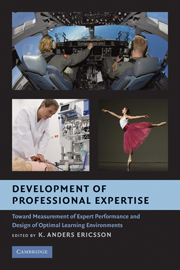 Development of Professional Expertise
Development of Professional Expertise Book contents
- Frontmatter
- Contents
- List of Figures
- List of Tables
- List of Contributors
- 1 The Measurement and Development of Professional Performance: An Introduction to the Topic and a Background to the Design and Origin of This Book
- SECTION 1 CHALLENGES IN PAST AND CONTEMPORARY EFFORTS TO MEASURE AND TRAIN THE OBJECTIVE PERFORMANCE OF PROFESSIONALS
- SECTION 2 PAST AND CONTEMPORARY EFFORTS TO DESIGN INSTRUCTION, TRAIN, AND MAINTAIN PROFESSIONAL PERFORMANCE
- SECTION 3 THE ASSESSMENT AND TRAINING OF SKILLED AND EXPERT PERFORMERS IN THE MILITARY
- SECTION 4 THE DEVELOPMENT OF EXPERTISE AND EXPERT PERFORMANCE
- 15 The Influence of Learning Research on the Design and Use of Assessment
- 16 Acquiring Conceptual Expertise from Modeling: The Case of Elementary Physics
- 17 Teaching for Expertise: Problem-Based Methods in Medicine and Other Professional Domains
- 18 Enhancing the Development of Professional Performance: Implications from the Study of Deliberate Practice
- 19 It Takes Expertise to Make Expertise: Some Thoughts About Why and How and Reflections on the Themes in Chapters 15–18
- 20 The Value of Expertise and Expert Performance: A Review of Evidence from the Military
- 21 Expertise in the Management of People: A New Frontier for Research on Expert Performance
- Name Index
- Subject Index
- References
18 - Enhancing the Development of Professional Performance: Implications from the Study of Deliberate Practice
Published online by Cambridge University Press: 04 August 2010
- Frontmatter
- Contents
- List of Figures
- List of Tables
- List of Contributors
- 1 The Measurement and Development of Professional Performance: An Introduction to the Topic and a Background to the Design and Origin of This Book
- SECTION 1 CHALLENGES IN PAST AND CONTEMPORARY EFFORTS TO MEASURE AND TRAIN THE OBJECTIVE PERFORMANCE OF PROFESSIONALS
- SECTION 2 PAST AND CONTEMPORARY EFFORTS TO DESIGN INSTRUCTION, TRAIN, AND MAINTAIN PROFESSIONAL PERFORMANCE
- SECTION 3 THE ASSESSMENT AND TRAINING OF SKILLED AND EXPERT PERFORMERS IN THE MILITARY
- SECTION 4 THE DEVELOPMENT OF EXPERTISE AND EXPERT PERFORMANCE
- 15 The Influence of Learning Research on the Design and Use of Assessment
- 16 Acquiring Conceptual Expertise from Modeling: The Case of Elementary Physics
- 17 Teaching for Expertise: Problem-Based Methods in Medicine and Other Professional Domains
- 18 Enhancing the Development of Professional Performance: Implications from the Study of Deliberate Practice
- 19 It Takes Expertise to Make Expertise: Some Thoughts About Why and How and Reflections on the Themes in Chapters 15–18
- 20 The Value of Expertise and Expert Performance: A Review of Evidence from the Military
- 21 Expertise in the Management of People: A New Frontier for Research on Expert Performance
- Name Index
- Subject Index
- References
Summary
Sources of large individual differences in professional achievement are still inadequately understood. Experience in a domain of activity appears to be necessary to perform adequately, but extensive experience does not invariably lead people to attain superior (expert) performance. When individuals are first introduced to a professional domain after completing their training, preparation, or education, they are often confused and must rely on advice from more-experienced colleagues to complete their responsibilities. After months or even years of mentored experience, their independent work reaches an acceptable level. Virtually everyone in a given domain of activity tends to improve with experience during this initial phase. After this point there are, however, considerable individual differences in development. Some professionals continue to improve steadily during many years or even decades, and are eventually recognized by their peers as having attained the highest levels as experts or masters. In contrast, most professionals in a domain reach a stable, average, undistinguished level of achievement within a relatively short time frame and maintain this mediocre level for the rest of their careers.
The nature of these individual differences in attained achievement is still controversial. The most common and traditional explanation is that individuals' achievements in any domain are limited by innate factors that cannot be changed through experience and training; hence, limits of attainable performance are determined by the person's basic endowments, such as physical and anatomical characteristics, mental capacities, and inborn talents.
Information
- Type
- Chapter
- Information
- Development of Professional ExpertiseToward Measurement of Expert Performance and Design of Optimal Learning Environments, pp. 405 - 431Publisher: Cambridge University PressPrint publication year: 2009
References
Accessibility standard: Unknown
Why this information is here
This section outlines the accessibility features of this content - including support for screen readers, full keyboard navigation and high-contrast display options. This may not be relevant for you.Accessibility Information
- 64
- Cited by